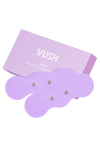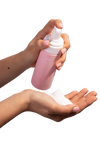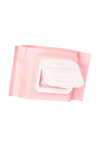
Jamie (she/her) is a 25-year-old member of the VUSH Wellness community. After suffering with cycle-related pain and symptoms for over 15 years, she has recently been diagnosed with PCOS. Polycystic ovary syndrome (PCOS) is a silent illness and endocrine condition characterised by some or all of the following symptoms: irregular menstrual cycles, high testosterone levels, insulin resistance, and immature egg follicles. You can find out more about PCOS here (and now’s the time considering September is PCOS Awareness Month). We asked Jamie 5 questions about her PCOS, here’s what she said:
1. What was your journey of being diagnosed with PCOS like?
My journey to being diagnosed was very long and frustrating. Since I started menstruating at 8 years old, I knew it wasn’t supposed to be so painful and debilitating.
I would go to GP’s and even emergency departments but was constantly told it’s just period pain and I should take Panadol.
I would constantly be throwing up, fainting, and taking a week off school or work each month but it felt like everyone just diminished my pain and experiences.
I basically ended up convincing myself that I was weak and needed to get over it.
I gave up trying to seek help for years because of my experiences of no one listening to or believing me.
Finally, I raised it with my new, incredible GP who went through my history, both physical and mental health and sent me off for ultrasounds. He told me that I shouldn’t have to put up with these symptoms each month and that alone made me feel so validated.
Shortly after getting my ultrasound, I got diagnosed with PCOS. I was weirdly excited about getting the diagnosis just because I finally felt heard. It was exciting because now I knew I could begin the journey to learning to manage my symptoms.
2. What type of PCOS do you have and what are your symptoms?
I have both insulin resistant PCOS and inflammatory PCOS.
My symptoms started at 8 years old with severe period pains and cystic acne.
The pain would be so unbearable that I couldn’t stand up and I would vomit and faint regularly.
As I got older, I started noticing other symptoms that at first, I wasn’t sure were PCOS related, but now I know are, such as excessive hair growth, super heavy periods, constant joint pain, fatigue, bowel issues.
The week before I was due for my period, I would always go into a very deep depressive stage. I could not shake this depression and I frequently had suicidal thoughts during the week prior to my period. It honestly was quite scary and strange to experience because it was the same time every month I felt this way.
At 23, I also randomly gained over 20kgs in a very short amount of time. This didn’t make sense because my diet and exercise routine didn’t change. Ultimately, this weight-gain was the thing that led me to raising my symptoms with my new GP after years of being dismissed.
3. How does your PCOS impact your family and relationships?
The main way PCOS impacts my family and friends is the impact it has on my mental health.
As previously mentioned, the week prior to my period is a very dark time for my mental health. During this time, I often have no energy to see or talk to my friends. I also get worried about being rude to them because I’m in such a bad place myself.
I often have to cancel plans during the week of my period due to the pain. Again, this sucks because I end up feeling so awful for cancelling on my friends.
Luckily, I have the best friends in the world, and they are super understanding and they always encourage me to put myself first and to rest when I need to.
4. How important are online communities for people with chronic conditions like PCOS?
Online communities are very helpful for not feeling so alone in your journey. Seeing others who are able to embrace their extra body hair or who encourage you to listen to your body and rest when you need to is invaluable.
Because so many of us are dismissed by medical professionals (which needs to change), having others online who validate your experiences makes things that little bit easier.
I also think the online community is helping spread awareness to people who don’t understand PCOS, which hopefully will result in more people being understanding of their friends, co-workers, family members etc who often struggle with the symptoms.
5. How do you manage your PCOS on a regular basis?
I’m still trying to work out the best way to manage my PCOS with my GP. They’ve been super helpful in supporting me to not give up and keep trying different ways to make sure I feel my best.
So far, being on the pill has really helped with my pain. I know the pill isn’t for everyone, but for me it has really helped me be able to get out of bed when I have pain during my period.
I also have been working with a psychiatrist to help my Premenstrual Dysphoric Disorder (PMDD) symptoms. I’ve increased my anti-depressant dosage the week prior to getting my period. This has been the best thing for me. I’ve really seen a huge difference in my emotions and it's honestly life changing.
I also am focusing on my diet. I’m starting to pay more attention to what foods make me feel good and what makes me feel bad. Limiting my dairy intake has made a huge difference in making me have less stomach issues and less pain. I think what is most important for me is not cutting out a whole food group but limiting it and paying attention to how certain foods make my body feel. This is much more sustainable for me.
The most important thing to remind myself when managing my PCOS is to let myself rest and not feel guilty about it. PCOS is painful, exhausting, and frustrating, so reminding myself that I am allowed to rest and stay in bed sometimes is so important.
Reach Out If You’re Struggling
And finally, a note from the VUSH Wellness team:
If you resonate with any of the symptoms of feelings mentioned in this interview with Jamie, please speak to a healthcare professional. Consider working with a variety of healthcare professionals such as GPs, pelvic floor physiotherapists, dieticians, naturopaths, Chinese medicine practitioners, endocrinologists, gynaecologists, and more.
If you’re living with a chronic illness and want to share your experience with the VUSH team, please contact us or submit an enquiry to work with us. We are always looking for stories to tell and lived experiences to learn from.
More from VUSH Wellness
For more information on PCOS, read our blog on the causes, symptoms, and treatments of polycystic ovary syndrome. To find out how you can support someone with PCOS, read our tips for helping a loved one with a silent illness.
To learn about endometriosis, we’ve given you the rundown on endo. We’ve also had endo warrior Bridget Hustwaite tell us about her journey with endometriosis.
For pain relief related to PCOS or endo, get your hands on our compact and stylish TENS machine. Learn about the benefits of a TENS machine now.










 AUD $
AUD $
Leave a comment (all fields required)